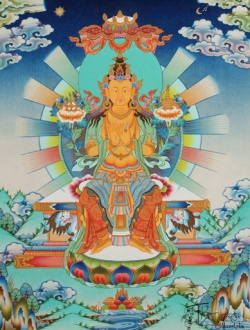Difference between revisions of "Ajita"
(Created page with "thumb|250px| <poem> Ajita [阿逸多] (Skt)(Jpn Aitta) (1) Another name for Bodhisattva Maitreya. Ajita means invincible. (2)[阿逸多]...") |
|||
| Line 4: | Line 4: | ||
[阿逸多] (Skt)(Jpn Aitta) | [阿逸多] (Skt)(Jpn Aitta) | ||
| − | (1) Another name for Bodhisattva Maitreya. Ajita means invincible. | + | (1) Another name for [[Bodhisattva]] [[Maitreya]]. Ajita means invincible. |
| − | (2)[阿逸多]( Jpn Aitta): A follower of Shakyamuni whose story appears in the Nirvana Sutra, where the great physician Jivaka relates it to assure Ajatashatru that his grave offenses can be eradicated. When Ajatashatru broke out in virulent sores and repented for having killed his father, Jivaka advised him to seek the teachings of Shakyamuni and told him the following story: Ajita, who lived in Varanasi, had an incestuous relationship with his mother and killed his father. When his mother had relations with another man, he killed his mother as well. He also killed an | + | (2)[阿逸多]( Jpn Aitta): A follower of [[Shakyamuni]] whose story appears in the [[Nirvana]] [[Sutra]], where the great physician Jivaka relates it to assure Ajatashatru that his grave offenses can be eradicated. When Ajatashatru broke out in virulent sores and repented for having killed his father, Jivaka advised him to seek the teachings of [[Shakyamuni]] and told him the following story: Ajita, who lived in [[Varanasi]], had an incestuous relationship with his mother and killed his father. When his mother had relations with another man, he killed his mother as well. He also killed an [[Arhat]]. He then went to [[Jetavana]] [[Monastery]] in Shravastiand sought admission to the Buddhist Order. Knowing that he had committed three of the five cardinal sins, the [[Monks]] refused him. In [[Anger]], he burned down many of the [[Monastery]] buildings and then went to Rajagriha to meet [[Shakyamuni]] and seek entry into the Order. [[Shakyamuni]] granted him admission and expounded teachings to eradicate his serious offenses and arouse in him the aspiration for supreme [[Enlightenment]]. |
(3)[阿耆多]( Jpn Agita): Also known as Agnidatta. See Agnidatta. | (3)[阿耆多]( Jpn Agita): Also known as Agnidatta. See Agnidatta. | ||
</poem> | </poem> | ||
Revision as of 01:59, 29 April 2013
Ajita
[阿逸多] (Skt)(Jpn Aitta)
(1) Another name for Bodhisattva Maitreya. Ajita means invincible.
(2)[阿逸多]( Jpn Aitta): A follower of Shakyamuni whose story appears in the Nirvana Sutra, where the great physician Jivaka relates it to assure Ajatashatru that his grave offenses can be eradicated. When Ajatashatru broke out in virulent sores and repented for having killed his father, Jivaka advised him to seek the teachings of Shakyamuni and told him the following story: Ajita, who lived in Varanasi, had an incestuous relationship with his mother and killed his father. When his mother had relations with another man, he killed his mother as well. He also killed an Arhat. He then went to Jetavana Monastery in Shravastiand sought admission to the Buddhist Order. Knowing that he had committed three of the five cardinal sins, the Monks refused him. In Anger, he burned down many of the Monastery buildings and then went to Rajagriha to meet Shakyamuni and seek entry into the Order. Shakyamuni granted him admission and expounded teachings to eradicate his serious offenses and arouse in him the aspiration for supreme Enlightenment.
(3)[阿耆多]( Jpn Agita): Also known as Agnidatta. See Agnidatta.
